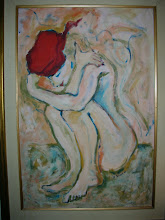
Sarah Ruhl is a new and powerful force in the playwriting world. She won the MacArthur “genius” grant. Her most notable piece, The Clean House, was a Pulitzer Prize finalist in 2005, and she has achieved successful runs with some of her other plays such as Eurydice and Passion Play.
However, Sarah Ruhl is not considered a good playwright in this artist’s opinion because of the success of her plays or the prizes she’s won or almost won. She is a good playwright because her plays feel so fresh. I get a sensation, reading her work, of being in a room with high ceilings and white drapes on tall windows, a warm breeze circulating. I feel this way partly because her writing on the page is so open and breezy. The dialogue and action have lots of space to be read and enjoyed, nothing is cramped or forced. She also gives the reader a treat with her stage directions:
“She writes in her journal, something secret and beautiful. She makes up a metaphor.”
 Compared to the usually dry and sparse stage directions in other plays, this is poetry. She lays down the secret emotional actions of the characters, which makes it both clear for the reader and the actor what is happening in that moment. The clarity is refreshing.
Compared to the usually dry and sparse stage directions in other plays, this is poetry. She lays down the secret emotional actions of the characters, which makes it both clear for the reader and the actor what is happening in that moment. The clarity is refreshing. The other reason I describe her writing as “fresh” is because of the surreal aspects she weaves into her work. She imagines an elevator that rains as the transportation from earth to the underworld in Eurydice. In Melancholy Play she writes that a woman turns into an almond. The surreal elements keep her writing completely unpredictable and exciting, never trudging down a path you’ve already visited. It’s fresh.
Ms. Ruhl has also inspired my own work. Although I can’t hope to, and wouldn’t try to, imitate  her style, I really enjoyed her exploration of the Greek myth of Orpheus and Eurydice and have decided to adapt a myth of my own. I’m writing the love story between Eros and Psyche, and I hope to pay a lot of attention to the subtle emotions and motivations of each character, after Ms.
Ruhl.
her style, I really enjoyed her exploration of the Greek myth of Orpheus and Eurydice and have decided to adapt a myth of my own. I’m writing the love story between Eros and Psyche, and I hope to pay a lot of attention to the subtle emotions and motivations of each character, after Ms.
Ruhl.
 her style, I really enjoyed her exploration of the Greek myth of Orpheus and Eurydice and have decided to adapt a myth of my own. I’m writing the love story between Eros and Psyche, and I hope to pay a lot of attention to the subtle emotions and motivations of each character, after Ms.
Ruhl.
her style, I really enjoyed her exploration of the Greek myth of Orpheus and Eurydice and have decided to adapt a myth of my own. I’m writing the love story between Eros and Psyche, and I hope to pay a lot of attention to the subtle emotions and motivations of each character, after Ms.
Ruhl.Source:

